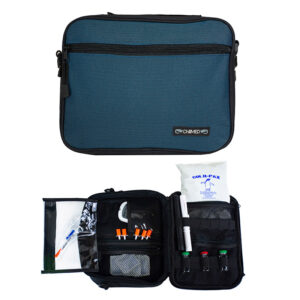Up, Up, and Away
The year is quickly coming to a close. Here in the Midwest, we have already received our first snowfall. To be honest, I’m not sure if I’m excited about this or deeply saddened. Either way, I can’t do much about it. My puppy is all about it though, so I suppose I HAVE to like it now. With the cold weather, we need something to look forward to. For me (and many others) it is the holiday season and/or traveling. However, traveling with a medical condition or chronic illness can seem daunting. Simply thinking of how many supplies you need, bringing sharps through TSA, and getting everyone out the door on time is chaotic.
Can I Bring That?
Traveling via airplane is stressful. Making sure all your carry-on liquids are under the required 3.4 ounces, putting them in bags, taking your laptop, camera, and other electronics out while going through security. Making it to your gate on time, remembering your headphones, earplugs, passport, phone charger, and more. It can be enough to induce some significant anxiety because no one wants to forget something important or miss their flight. Trust me, I’ve done both and it is not ideal. I was stuck in the Korea International Airport for 16 hours after missing a flight, but that’s a story for another time.
Now, if you have a chronic illness, say diabetes, then traveling is a little trickier. With all the extra supplies, gadgets, sharps, liquids, and ice packs it can be overwhelming. If you’re like me, you’re probably a person who over-packs for every trip. The good news is, if you have a medical condition then you are allowed to bring an additional carry-on just for your medical supplies. You’ll have your regular carry-on, personal item, and medical bag. You can also check bags that are transporting ONLY medical supplies for free. Make sure to ask your airline in advance to make sure their policy hasn’t changed.
In order to make the security process a little easier get yourself a TSA Notification Card or a detailed note from your doctor explaining your condition.
Screening Time
As you’re going through the security process, be sure to tell the TSA officer that you have medically necessary liquids and/or medications before the process starts. Likewise, be sure that you declare any ice packs, gel packs, IV bags, or syringes. If you want to be extra prepared to ensure that things go smoothly, you can label each of these items.

When it comes to going through security in America with a declared ice pack, things can be a little iffy. I called TSA a month ago to get more information on what they allow, and this is what I found out:
- You must take the ice pack out of your carry-on. If the ice pack is inside a supply bag, then take the bag out of your carry-on as well.
- If you haven’t already done so, make sure that the security knows you use the ice pack for medical reasons.
- When the ice pack is fully frozen, then there shouldn’t be an issue. However, when the ice pack is mushy or about half-frozen, then they may have to inspect it.
While on the phone with the TSA Agent, she told me that it’s in your best interest for the ice pack to be as frozen as possible. If the goal of the ice pack is to keep medication cool, then it should be doing its job. She said it gets a little iffy the ice pack isn’t doing its job because then it may seem not medically necessary to some TSA officers. The solidness of the ice pack is accepted or denied based on the subjectivity of the officer. However, if you have a note stating you need it, then you should be good to go.
Take Off
As you’re getting ready to head to the airport, be sure to check your packing list twice. If you’re like me, you’ll probably check it at least three times. When it comes to medical supplies, pack extra. The last thing you want to do is run out of a life-saving medicine or have a severe complication in a different country or state away from your primary physician.
Now, sit back, relax, and enjoy your flight. Even grab a drink from your flight attendant if you’re feeling a little adventurous.
You know where to find me for help, questions, or just to chit chat.
GMS,
Made for your Health
Resources:
https://www.tsa.gov/travel/security-screening/whatcanibring/medical
